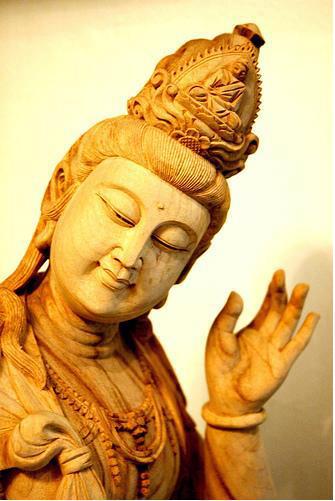What is Mindfulness?
Mindfulness is an inherent ability that we all have to live in a state of awareness moment by moment; to actually be present in a whole way. At any given moment mindfulness invites us to be aware of our breath and body sensations, our feelings, mental states, which are composed of emotions and thinking. It is non-judgmental awareness. How often do we really notice what is going on within and how influences are affecting us?
 The Japanese have a wonderful phrase that captures the essence of mindfulness ichigo ichi “one meeting, one moment, one time”. Each moment is unique and special, never to be experienced exactly the same way again. This awakens us to the opportunity to live with appreciation and happiness.
The Japanese have a wonderful phrase that captures the essence of mindfulness ichigo ichi “one meeting, one moment, one time”. Each moment is unique and special, never to be experienced exactly the same way again. This awakens us to the opportunity to live with appreciation and happiness.
Yet, what takes us away from being mindful? The rate and pace with which we live our modern life; getting caught up in future time; planning and the endless focus on the to do list, multitasking; distractions like the cell phone and instant messenger; headphones in the gym so not present when exercising; caught in the past and reliving conversations which happened yesterday; habits which take us away. We become oblivious to the present moment and pulled outside ourselves. This way of living leads to a kind of dullness, living life on automatic; rather than realizing that this moment is truly life! These are simply habits and they can be retrained.
We can liken this awareness to a scientist in the lab examining things under a microscope. We see what is there, as it is, these are the facts, we do not look to embellish or subtract. This allows us to see clearly (Vipassana) what is at hand. We can say that mindfulness observes and maintains neutrality toward what it perceived. This is called bare attention. It is a type of recognition, a noticing, registering of experience. Mindfulness does not analyze, reject or attempt to control.
Living in this way has a kind of freshness and vitality. We begin to engage things more like a child would with curiosity and fascination. We live less with concepts and ideas about what we encounter. This is a non-biased living. It becomes possible to experience a person or a place with fresh eyes, fresh ears, fresh hearing. Think what it could be like to see someone you know as if you never saw them before. This is called Beginners Mind. When we live with mindfulness our natural innocence is brought to the forefront, a tableau rosa, the slate is wiped clean. Coming back to a natural state of innocence more like a child, it is refreshing.
This non-judgmental awareness is a kind of impartial witnessing. It does not take sides and say this is good and this is bad; right or wrong. It is not defensive or offensive, non-prejudicial. Mindfulness gives us a direct experience of what is truly there. We are able to slow down and to “see more clearly”. We see our behavior; what triggers us, how our postural habits are affecting us, what thoughts are running through our mind and how this is influencing our emotional state. Eventually we begin to connect the dots and realize that it is possible to have a choice in our behavior. We can notice what is present moment by moment in this way and say “Oh, this is the way it is or that’s interesting”. Mindfulness reveals our inner reality to us.
It asks us to cultivate acceptance of ourselves. We may not like what is here in this moment, yet this is how it is. Can I let it be as it is? Without acceptance I cannot objectively observe. My awareness is half baked. In order to be aware of fear I have to accept that fear is present. How authentic is it if I do not accept, deny or resist? In this way it is non-reactive to life. Life becomes much less stressful; responding to life rather than reacting to it.
Living mindfully is not an event, something we do once or twice; it is actually a process-oriented way of living. It unfolds over time and the results are cumulative. We cultivate it through intention and practice. As we practice through meditation and in other ways we begin to notice when we are mindless or mindful. Our practice itself is what allows us be mindful.
“Mindfulness is non-superficial awareness. It sees things deeply, down below the level of concepts and opinions. This sort of deep observation leads to total certainty, a complete absence of confusion. It manifests itself primarily as a constant and unwavering attention which never flags and never turns away”. —Bhante Henepola Gutarantana
